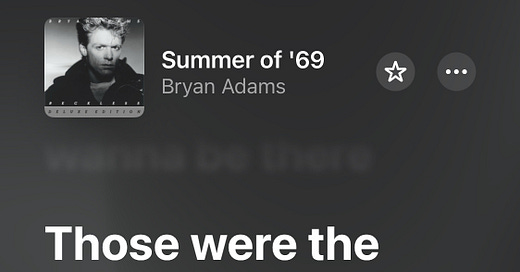The Best Year of My Life—Until I Looked Closer
When I started therapy, my therapist asked me to reflect on a time when I felt like life was going really well. Without hesitation, I said 2018.
That was the year I was training for a half marathon. I was running 10 to 15 miles a week. I was going to the gym consistently. I felt strong. I turned 40 and had energy in my body and hope in my heart.
We were planning a family trip to Disney World, something we’d dreamed about for years. We had just found out we were expecting a new baby in early 2019. And perhaps most meaningful of all—our oldest child had made the decision to stay with our family. That choice wasn’t simple. It carried a quiet kind of joy, born out of struggle, repair, and trust.
I could’ve added a soundtrack: Bryan Adams singing “those were the best days of my life.”
And for a long time, that’s what 2018 was in my memory: golden, energized, and full of possibility.
But last week, I stumbled on some photos that told a different story.
One picture showed our kid in a cast. It was the second time they had broken their arm—falling down the stairs again. Another photo brought back a terrifying moment: the same child being rushed away in an ambulance after going into anaphylactic shock.
We thought we might lose them.
That memory had been buried under Disney plans and training runs.
Suddenly, 2018 didn’t feel like a perfect year. It felt like a full one.
A year of beautiful highs and terrifying lows. Of growth and fear and love and stress and perseverance.
How Our Memories Work (and Work on Us)
Psychologist Daniel Kahneman wrote:
“The experiencing self is the one that answers: ‘Does it hurt now?’ The remembering self is the one that answers: ‘How was it, on the whole?’”
In the story I had told myself, 2018 had been mostly smooth sailing. But that wasn’t the experience—that was the memory.
And that’s the thing: the remembering self shapes how we feel about the past, but it also guides how we imagine the future. Kahneman warns of “the tyranny of the remembering self.” If we aren’t careful, it can trap us in comparison, nostalgia, or regret.
In remembering 2018 only through rose-colored lenses, I was at risk of disqualifying every year that came after it.
I was setting up an unreachable standard.
I was romanticizing the past—and robbing the present.
How I’m Reframing the Story
Gratitude for the Highs
That year was good. But not because it was flawless—it was good because I can see its fullness now. I can honor its joy and its difficulty.
I’m learning that if I want future years to feel “great,” I have to pay attention when they’re happening. I have to let the good in, even when it’s mixed with the hard.
Writing helps. Reading helps. Gratitude helps.
Marie Kondo taught me to thank clothes before letting them go. I’m trying to do that with experiences too—recognizing the service they gave me, even if they came with some pain. If you believe in a higher power, as I do, then don’t forget: we still get to co-author the story. We are not just recipients of blessings. We are participants.
Focus on Opportunity
“Never judge a story by the chapter you walk in on.” — Anonymous
We know this when we read biographies. We’d never define Nelson Mandela by his prison years alone. Or Robert Downey Jr. by his addictions. Or Malala by the moment she was silenced. Their lows weren’t the ends of their stories.
And neither are ours.
“We actually don’t choose between experiences, we choose between memories of experiences.” — Kahneman
If I want my remembering self to have more to work with, I have to live now with intention.
Recently I’ve had weeks where multiple responsibilities collided. I kept thinking, What if I get this wrong? But when I imagined a version of myself who handled it—flawed, but faithful—I felt lighter. Hopeful. Energized.
Each day is a chance to write a better memory.
Look Back With Suspicion
2018 wasn’t perfect. And 2020 wasn’t all bad. Our memory selects. It exaggerates. It rearranges.
So now, I look back with a healthy dose of suspicion.
Was it really as good as I remember? Or as bad as I feared?
Journals and photos help. But even without them, we can choose to assume that our perspective might be incomplete.
“There is a constant mismatch between the remembering self and the experiencing self. We have to choose which one we trust.”
What Comes Next
I could’ve kept singing my own version of Summer of ’69 forever. But I don’t want to get stuck in a story I’m not living anymore.
I want to:
Keep reflecting, reading, and writing.
Stay open to growth and gratitude.
Let go of nostalgia when it gets in the way.
Let the present tell its own story.
2018 was beautiful. But so is now.
And I’m learning how to live like I believe that.



